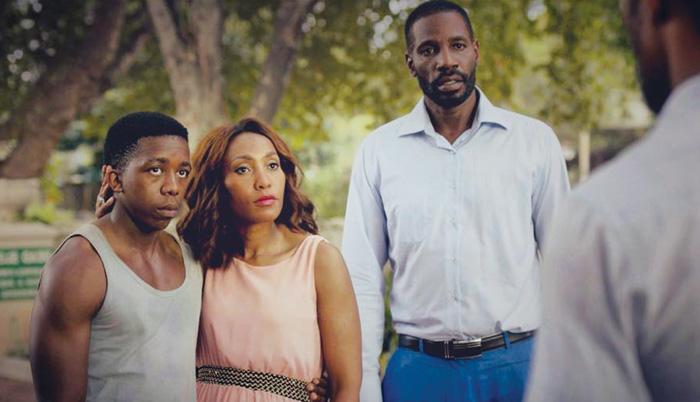
The Jakes are Missing – Film Review

A milder and more humorous take on storytelling from South African cinema brings yet another movie that will make you wonder why they even bothered adapting the script for the big screen. Indeed, the Jakes may be missing, but a fray of loose ends and clichés can be located just about everywhere in this film.
Fig Jam Entertainment and Bianca Isaac bring you a story that circles around an urban family of three people, struggling to sustain their unity. Janice (Mampho Brescia) and Donald Jakes (Pope Jerrod) just can not connect with each other. Simon Jakes (Mpho Sebeng) may be caught up in the middle but these parental pressures do not shadow his dream of becoming a rock star. One night, however, after being grounded, he sneaks out to attend a rock concert, which instead lands Simon in the wrong place at the wrong time, ending up in the middle of an undercover operation where a couple of gang members are smuggling a microchip. Now that Simon and his family’s safety are compromised, they move to a small town as part of the police department’s witness protection programme.
This film has all the makings of a likable adventure story … except perhaps the fact that this has been done before. Is anyone familiar with Tyler Perry movies? In fact, if you are familiar with African American cinema, you will find a lot of its clichés being echoed through this film.
Although I do understand that there is hardly anything new under the sun, I do not think the makers of this film were able to capture the South African personality from a more unique yet wholesome perspective.
With this particular script, it was not necessary to expand its attention on all three family members and a more focused story could have worked out better. Simon’s perspective alone could have been developed to provide a more distinctive angle. However, the story ends up with a blend of ingredients that do not need to be there.
The cinematic elements, however, are definitely the glue that binds the story together, with clear visuals, and dynamic camera angles that give a more refreshing view of the story line than the plot itself. The countryside flora and vast landscapes are what mainly give this film its South African energy and flavour. All of this, however, is wasted on an overplayed story, and the local personality that it tries to capture can barely shine through.
One thing I have noticed is that it is rather difficult to pinpoint South African ‘authenticity’ through its cinema. With some of the top ranking films depicting some form of hardship like gang life or personal/demographical strife (Tsotsi, Gangster’s Paradise: Jerusalema, District 9), it is quite difficult to see how any other genre can filter through as one of the large successes. Perhaps the only successful South African film I can think of with a story that does not fall into these brackets is Spud. Because it is centred on one boy’s perspective, we get a more original take on the experience, rather than a played out story of a family’s misadventures. I strongly believe the makers of this film could have produced something more wholesome had they simply narrowed it down.












































